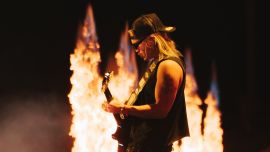It’s easy to attribute intellectual prowess to powerful people – many times we imagine their consequential decisions as premeditated master strokes, magisterial moves in the grand chessboard of politics. But generally reality tells us exactly the opposite: they are common people with common thoughts who happen to make decisions about very public things that involve us all. In a football-obsessed country like Argentina we attribute the same level of foresight to successful football managers, from national team manager Líonel Scaloni on down, even if at first everyone was sure they were destined for failure.
When it comes to Cristina Fernández de Kirchner, most observers believe they are in the face of Machiavellian grandeur, beyond what one may think about her political and ideological position. But as Gustavo Gonzaléz has explained several times in his Sunday columns for Perfil, Cristina is probably an ordinary woman, not much different from other residents of the swanky Buenos Aires neighbourhood of Recoleta, who enjoys watching films and series on Netflix and ice cream from Rapa Nui. Her political cunning has been on display for three decades and she’s alternated victories with defeats, yet she clearly outsmarted the whole political system when she decided to take the passenger seat in the presidential ticket in 2019, picking Alberto Fernández as the perfect running-mate in order to oust Mauricio Macri. Yet, the ruling Frente de Todos coalition has proven to be an absolutely dysfunctional mismatch of interests that has made governability a nightmare plagued with inefficiency. To a certain extent they followed a similar model to Argentina’s main opposition coalition, which managed to secure a victory against Kirchnerism in 2015 but failed to run the state efficiently and left us mired in economic crisis.
Have the tables turned on Fernández de Kirchner? Public and private information indicates that President Alberto Fernández and Economy Minister Sergio Massa have an explicit agreement regarding who will lead the pan-Peronist front into the 2023 presidential election. Alberto was the first to speak of the PASO primaries as the ideal method to determine the candidate, much to the disgust of Cristina. who imagined herself as kingmaker. He continues to repeat that he will compete in the primaries despite consistent polling data indicating he’s one of the most detested politicians in the country. Still, in that position, he ranks better than the majority of potential candidates in his space given there’s really no competition – except Massa.
Argentina’s current economy minister is considered a pragmatist and an opportunist. He is the third leg of the ruling coalition together with the president and his (at least formally) second-in-command. Massa’s presidential ambitions have been on the table for years, a time during which he’s consistently weaved a network of allegiances with the private sector and the political ecosystem. He’s repeatedly said he won’t run this year and suggested his only preoccupation is stabilising the economy, yet he barely hides the excitement at the possibility of becoming president. The man from Tigre knows he’s won some points by taking over the hottest seat in the house after the bombastic self-ejection of Martín Guzmán and the inconsequential tenure of Silvina Batakis, managing to rein in certain macroeconomic variables on the back of piecemeal announcements aimed at shoring up the short-to-immediate-term. Making it to March or April with a downward trajectory for inflation and some level of economic growth will give him a platform to launch a bid.
The not-so-secret agreement between Alberto and Massa appears to be that the president will continue to claim he’s going to run, in order to avoid becoming a lame duck, while Massa has time to position himself the right way to lead the Frente de Todos into the presidential election. And what of Cristina? She’s already said she won’t run, but her crew, mainly concentrated in Kirchnerite youth organisation La Cámpora, has been clamouring to get her back in the race. She’s backtracked and reports indicate there’s no way she’ll take a leap of faith and run for president. In any case she may renounce her renouncement and lead the pan-Peronist ticket in senatorial elections in Buenos Aires Province. La Cámpora’s leading candidate appears to be the insipid Eduardo ‘Wado’ de Pedro who is far from competitive. Axel Kicillof, Crisitina’s protégé (whatever Máximo thinks), is being pressured to run, but prefers to compete in the nation’s most-populous province to retain the governorship. Finally, maybe Sergio and Alberto are “smarter than they seem” – they could be looking for an elegant way to displace Cristina from the leading role she’s starred in for so long. It is highly probable, from today’s point of view, that a hypothetical candidate Massa will lose the elections, but if he manages to run a successful campaign and retain an important portion of the electorate, he will become the de facto leader of the opposition, a position from which he could dream of success in the 2027 elections.
This situation is not unlike the opposition coalition, Juntos por el Cambio, which expects to take the big prize. Buenos Aires City Mayor Horacio Rodríguez Larreta has made his intentions clear for a couple of years now, even if he ridiculously shied away from accepting the “candidate” moniker until very recently. He’s also a pragmatist with a long history in public service, namely in the capital where he was Macri’s right-hand man until he took over as mayor, becoming the opposition’s most relevant figure and the main antagonist of the Frente de Todos. Interestingly, he’s also a longtime friend of Massa.
Rodríguez Larreta’s ambitions have sparked a fierce internal competition apparently egged on by Macri, who seeks to retain centrality and decision-making power. He’s encouraged Patricia Bullrich, who holds the chair of Macri’s PRO party, and has managed to insert his cousin Jorge Macri into Rodríguez Larreta’s City Hall Cabinet. Jorge now aspires to succeed his boss as mayor, which reads like a direct dispute of a space Rodríguez Larreta imagined is his own. Macri has hardened his rhetoric, adopting some right-wing positions that have seen him ideologically close to libertarian economist Javier Millei. They mutually complement each other. An internal fracture within the PRO has pitted hawks against doves and put pressure on Rodríguez Larreta as several candidates vie for his spot. It has also created a rift with allies in the Civic Radical Union (UCR), who are also divided between those who seek to break-up Juntos por el Cambio and others seeking the role of vice-president.
The easiest explanation would be that there is some sort of real break between Macri and his protégé Rodríguez Larreta as they battle to retain the lead role in the opposition. Yet, a certain collaboration could be read between the lines – Rodríguez Larreta has managed to obtain key concessions such as his former deputy Diego Santilli’s move into Buenos Aires Province and María Eugenia Vidal’s move back to the capital. Bullrich’s hardliner stance, along with Macri’s neoliberal anti-populism, appeals to a portion of the electorate that isn’t all that aligned with Rodríguez Larreta’s dialogue-prone manner, including Millei’s libertarians. And together they appear to be keeping the UCR at bay, despite neurosurgeon Facundo Manes’ insistence. It isn’t unreasonable to suppose that Macri and Rodríguez Larreta are executing a playbook that allows them to retain the key spots in Juntos por el Cambio’s electoral structure while appealing to a wide spectrum of potential voters, from far-right to centrist even to “rational Peronists.” And, if it pans out, he would be able to “negotiate” with his friend Massa across the aisle.
It’s all political speculation at this point, but the contours of continued bi-coalitionism can be seen through the fog.



















Comments